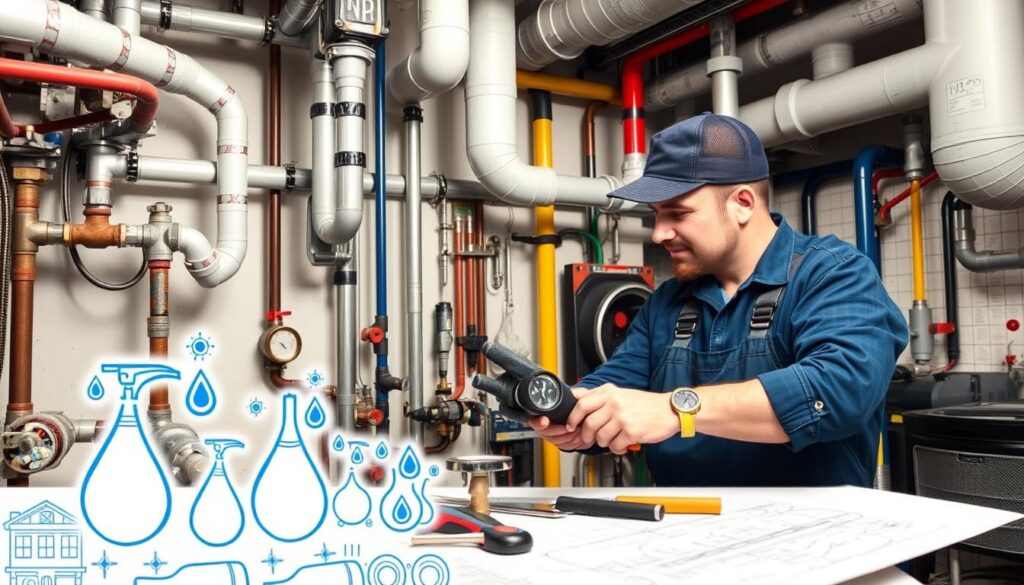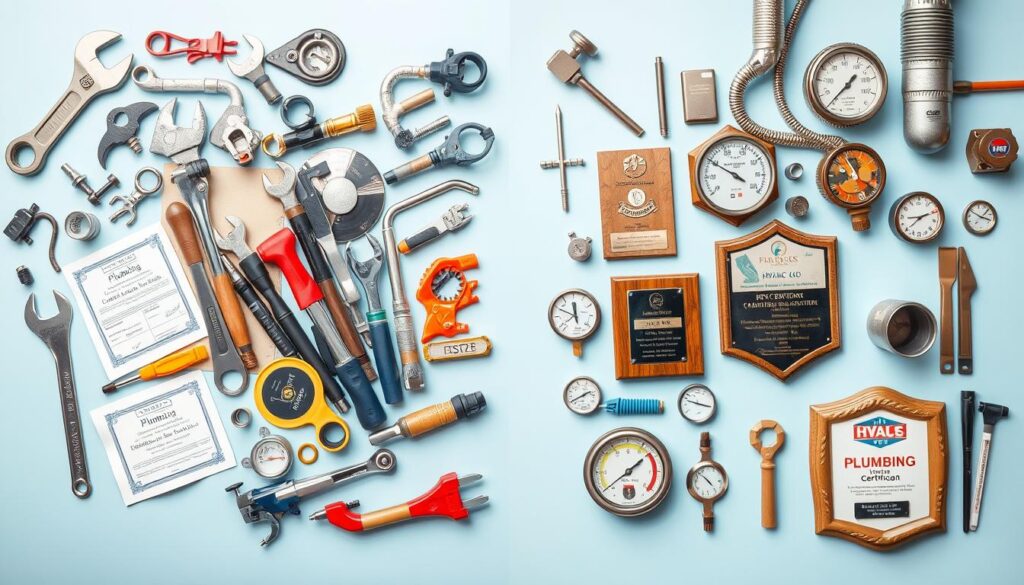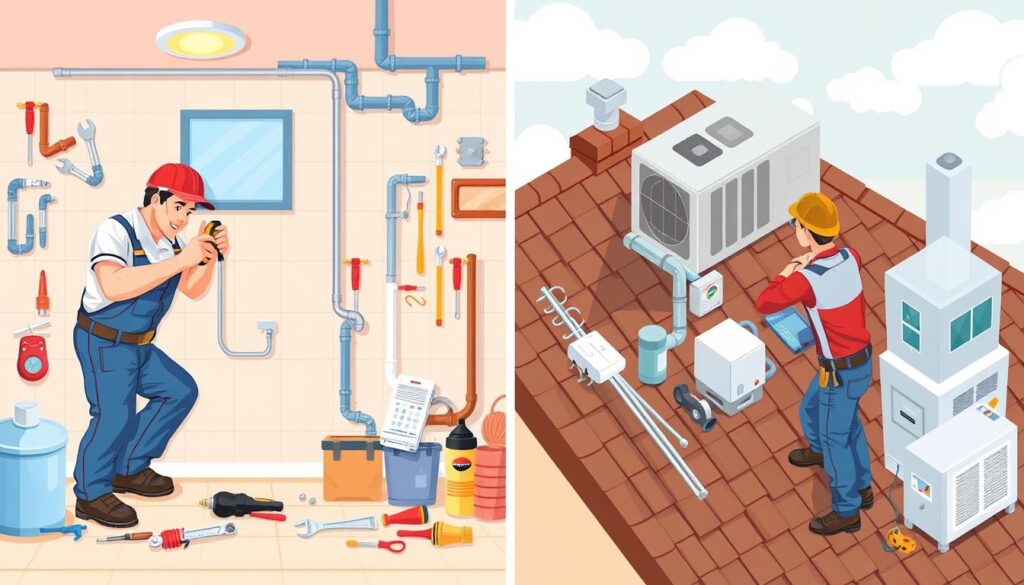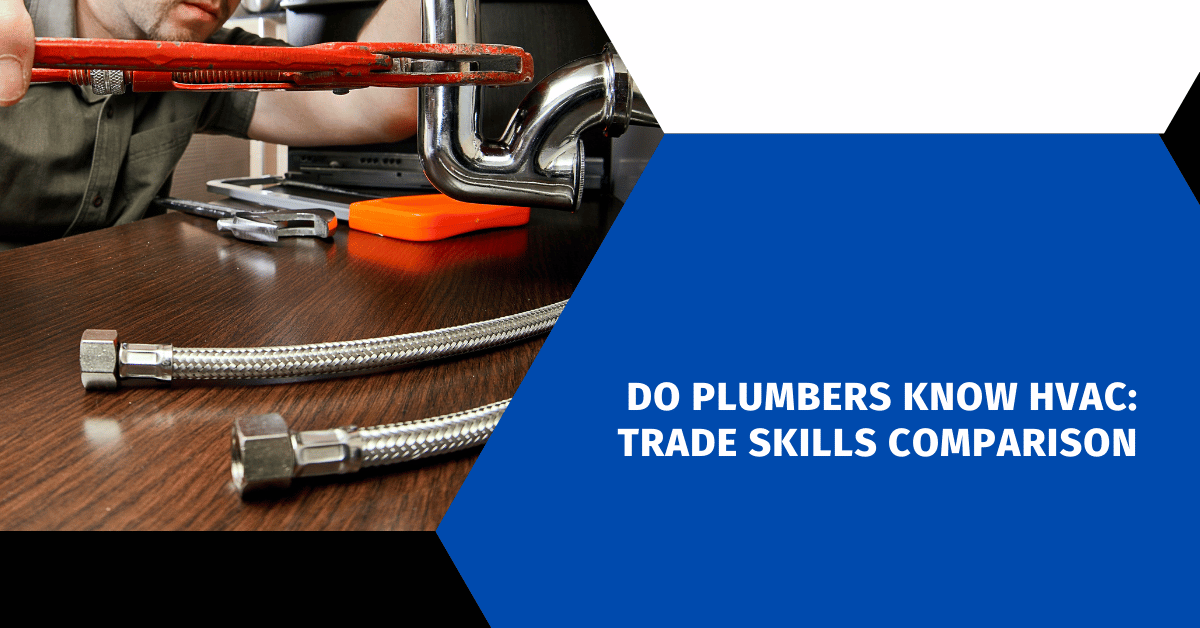Affiliate Disclosure
HVAC Guide Guys is a participant in the Amazon Services LLC Associates Program, an affiliate advertising program designed to provide a means for sites to earn advertising fees by advertising and linking to Amazon.
Do Plumbers Know HVAC? Do plumbers have the skills needed to do well in HVAC (Heating, Ventilation, and Air Conditioning)? This question has been a topic of debate among professionals. Plumbing and HVAC share some similarities but also have their own unique technical needs. Looking into what they have in common and what sets them apart can help those thinking about a career in either field.
It can also help those looking to learn new skills and expand their abilities. This is especially true for those interested in HVAC or plumbing, or even those who want to try their hand at both.

Key Takeaways
- HVAC technicians often have skills in plumbing too, showing it’s possible to excel in more than one trade.
- HVAC is seen as more complex and challenging than plumbing, needing a wider range of technical skills.
- Both HVAC and plumbing offer good salaries, with median incomes around $62,000-$65,000 in Ontario, Canada.
- Choosing between HVAC and plumbing depends on personal interests, skills, and career goals. Each trade has its own growth and specialization paths.
- The need for skilled HVAC and plumbing workers is growing due to new technologies and the push for energy-efficient solutions.
Table of Contents
Understanding the Overlap Between Plumbing and HVAC Trades
Plumbing and HVAC (Heating, Ventilation, and Air Conditioning) are two trades that often work together. Plumbing and hvac contractors team up on many projects. This is because HVAC systems rely on plumbing to function well.
Both trades need similar tools, follow the same safety rules, and understand how systems work together.
Basic Similarities in System Integration
Plumbers and HVAC technicians often work together. They make sure plumbing and HVAC systems work well together. For example, plumbers do the vent work in the attic with HVAC contractors.
HVAC pros handle ductwork and vents. They make sure everything is installed and sealed right for the best performance.
Common Tools and Equipment Used
Plumbers and HVAC technicians use many of the same tools. They use pipe cutters, wrenches, and pressure gauges. They also need to know building codes and regulations.
This knowledge helps them work well together. It makes it easier for some to switch between the two trades.
Shared Safety Protocols
Both trades follow the same safety rules. They work with dangerous materials, in tight spaces, and at heights. It’s important to handle tools and chemicals safely and follow rules for entering confined spaces.
This overlap in safety rules helps both hvac as part of plumbing trade professionals work better together. It also opens up chances for cross-training and exploring new career paths in the building trades.
Explore Our HVAC Shop
Looking for top-rated HVAC tools, parts, and accessories? Visit our shop and find the perfect solution for your needs.
Visit the ShopDo Plumbers Know HVAC: Essential Cross-Trade Knowledge
Plumbers mainly work on water systems, but knowing HVAC is also useful. They often meet HVAC parts when installing water heaters or radiant heating systems. Knowing about thermodynamics and heat transfer helps a lot in these situations.
HVAC technicians also benefit from knowing about water systems, especially with boilers or hydronic heating. Many vocational programs now teach both trades together. This gives tradespeople a broader skill set.
- Cross-training in plumbing and HVAC opens up more job opportunities. It also gives tradespeople a deeper understanding of home systems.
- Certified professionals often get more job requests. This means more job security and higher earnings.
- HVAC certification can lead to new career paths in areas like sustainable construction and government projects.
Plumbers with HVAC certification can handle more tasks, from pipe installation to fixing heating and cooling systems. HVAC technicians can also do basic plumbing, like installing water heaters and fixing leaks. This shared knowledge makes both professionals and their customers happier.
| Skill | Plumber | HVAC Technician |
|---|---|---|
| Thermodynamics and Heat Transfer | Beneficial | Necessary |
| Water Systems | Expertise | Helpful |
| Boiler and Hydronic Heating | Helpful | Expertise |
| Integrated System Knowledge | Enhances Problem-Solving | Enhances Efficiency |
The need for experts in eco-friendly plumbing and HVAC is growing. This has opened up new chances for certified individuals. Special areas like refrigeration and air quality control offer more career paths for plumbers with HVAC certification.
In summary, hvac training for plumbers and their ability to work on HVAC systems are key in the industry. Getting cross-trade knowledge and certifications boosts their skills, job chances, and career growth.
Core Differences Between Plumbing and HVAC Work
Plumbing and HVAC trades have some similarities but also big differences. These differences include technical skills, system complexity, and the tools needed. Knowing these differences helps decide if a plumber can handle HVAC work or if an HVAC expert is needed.
Technical Skill Requirements
HVAC techs need to know a lot about electrical systems, refrigeration, and air flow. They work with big machines like furnaces and air conditioners. Plumbers, on the other hand, focus on water systems and need skills in pipe fitting and welding.
System Complexities
The hvac scope of work for plumbers includes heating, cooling, and ventilation systems. These systems are complex and need special knowledge. Plumbing work is simpler, dealing with water systems, but can be complex depending on the job.
Specialized Equipment Needs
HVAC repair needs many tools, like refrigerant gauges and electrical multimeters. Plumbing tasks use tools for pipe work and leak detection. But HVAC tools are more complex.
Understanding the differences between plumbing and HVAC is key. It ensures the right trade expert is used for building systems. This helps homeowners and businesses make the right choices for their needs.
Explore Our HVAC Shop
Looking for top-rated HVAC tools, parts, and accessories? Visit our shop and find the perfect solution for your needs.
Visit the ShopTraining and Certification Requirements for Both Trades
People wanting to be HVAC technicians or plumbers in the U.S. need to meet similar requirements. They must finish an apprenticeship program. This includes a lot of on-the-job training and classroom learning.
HVAC techs need more than just an apprenticeship. They must get an Ozone Depletion Prevention (ODP) card and a gas technician certification from the Technical Standards and Safety Authority (TSSA). Plumbers might not need extra certifications unless they work with gas lines.
Pre-apprenticeship programs at schools like Herzing College are great for starting a career in HVAC or plumbing. These programs help you get into an apprenticeship and start your journey to becoming a skilled tradesperson.
| Certification Requirement | HVAC Technicians | Plumbers |
|---|---|---|
| Apprenticeship Program | ✓ | ✓ |
| Ozone Depletion Prevention (ODP) Card | ✓ | – |
| Gas Technician Certification (TSSA) | ✓ | Optional |
| Pre-Apprenticeship Program | ✓ | ✓ |
Getting licenses, permits, insurance, and certifications can be different in each state. It’s key for those starting in HVAC or plumbing to check their local requirements. This ensures they meet all the needed qualifications.

Income Potential: Comparing HVAC and Plumbing Careers
When looking at careers in the trades, making money is key. Hvac training for plumbers and plumber hvac skills share some similarities. Yet, HVAC and plumbing jobs have different pay levels.
Entry-Level Salary Expectations
HVAC techs and plumbers start with apprenticeships lasting three to five years. These programs give them real-world experience. Union jobs often pay more in both fields, thanks to group bargaining.
Advanced Career Earnings
More experience means higher pay for both HVAC techs and plumbers. Certified HVAC pros are seen as more skilled and earn more. Plumbers with master status make even more than those without it.
Self-Employment Opportunities
Both trades offer chances to work for yourself. This can lead to higher earnings. Income depends on specialization, extra certifications, and the ability to work overtime.
In conclusion, HVAC and plumbing jobs have similar earning potential. But, different factors affect their salaries. A successful career in either field needs education, experience, and specialized skills to boost income.
Explore Our HVAC Shop
Looking for top-rated HVAC tools, parts, and accessories? Visit our shop and find the perfect solution for your needs.
Visit the ShopWork Environment and Physical Demands
Plumbers and HVAC technicians have different work environments and physical demands. HVAC technicians often work in extreme temperatures. They might be in the heat of attics or the cold on rooftops.
They need to be comfortable with heights and have the stamina for the job’s demands.
Plumbers usually work indoors but might face cramped spaces and sewage. Both trades need manual dexterity, the strength to lift heavy equipment, and a strong work ethic.
Work hours for plumbers and HVAC technicians can be irregular. They have on-call shifts for emergencies. HVAC work sees seasonal changes, but plumbing demand stays steady all year.
| Plumber | HVAC Technician |
|---|---|
|
|
Both plumbers and HVAC technicians face unique challenges. They need diverse skills and adaptability to succeed in their trades.

Career Growth and Specialization Options
Both HVAC and plumbing trades have many career paths and specializations. HVAC techs can specialize in refrigeration, building automation, or energy auditing. Plumbers might focus on medical gas systems, fire protection, or water treatment. Getting advanced certifications can lead to better jobs and more money in both trades.
Advanced Certifications Available
HVAC techs and plumbers can get advanced certifications to boost their skills and careers. Some popular ones include:
- HVAC Excellence Certifications – Show expertise in HVAC systems, diagnostics, and energy efficiency.
- EPA Section 608 Certification – Needed for refrigerant work, ensuring safe handling and recycling.
- NATE (North American Technician Excellence) Certifications – Recognized by the industry for knowledge and skills.
- Green Plumbing Certifications – Highlight a plumber’s knowledge in water conservation and efficiency.
Industry-Specific Opportunities
HVAC and plumbing trades offer many chances for career growth and specialization. HVAC techs can become maintenance, service, installers, or air conditioning techs. Plumbers can specialize in medical gas, fire protection, or water treatment. They can also move up to supervisory roles, project management, or even start their own businesses.
The HVAC and plumbing industries are always changing, offering many career opportunities. By getting advanced certifications and exploring specific areas, both HVAC techs and plumbers can improve their skills, make more money, and have fulfilling careers.
Seasonal Work Patterns and Job Security
Working in the HVAC industry means you see big changes with the seasons. In summer and winter, HVAC work is in high demand. This leads to more overtime and higher pay. But, spring and fall can be slower, leaving some technicians with less work.
Plumbers, on the other hand, work all year. They’re always needed for repairs, maintenance, and new installations, no matter the weather. This steady work gives plumbers a job security that HVAC workers might not have.
Both HVAC and plumbing have bright futures. The Ontario government projects up to 2,000 job openings for each trade between 2023 and 2027. These jobs are crucial for keeping homes and businesses comfortable and running well. So, skilled workers in these fields will always be in demand.
| Metric | HVAC Technicians | Plumbers |
|---|---|---|
| Average Hourly Wage | $24.24 | $26.75 |
| Projected Job Growth (2020-2030) | 5% | 4% |
| Job Outlook | Positive | Positive |
Thinking about a career in hvac scope of work for plumbers or can plumbers work on hvac systems? Both paths offer solid job prospects. With the right training, certifications, and a dedication to learning, you can have a fulfilling and secure career in either field.
Explore Our HVAC Shop
Looking for top-rated HVAC tools, parts, and accessories? Visit our shop and find the perfect solution for your needs.
Visit the ShopTechnology Integration in Modern Trade Work
The HVAC and plumbing industries are changing fast. HVAC techs now use smart thermostats and energy-saving gear. Plumbers work with water-saving devices and smart home systems.
Knowing digital tools and apps is key for both trades. This helps them work better and serve customers well. AI tools are also changing how work is done, making it more efficient.
HVAC technicians should learn about automation systems and predictive maintenance. Electricians need to know about smart grids and IoT systems. Plumbers should focus on AI for leak detection and smart plumbing.
Staying updated with technology is crucial. Tradespeople should keep learning and use digital tools. This helps them stay ahead in the hvac knowledge requirements for plumbers and plumber hvac skills world.
| Technology Integration | HVAC Technicians | Electricians | Plumbers |
|---|---|---|---|
| Building Automation Systems | ✓ | ||
| Predictive Maintenance Tools | ✓ | ||
| Data Analysis Skills | ✓ | ||
| Smart Grid Technology | ✓ | ||
| IoT-Enabled Electrical Systems | ✓ | ||
| AI-Powered Electrical Design | ✓ | ||
| AI-Powered Leak Detection | ✓ | ||
| Smart Plumbing Solutions | ✓ | ||
| Remote Monitoring Skills | ✓ |
By keeping up with new tech, HVAC and plumbing pros can improve. They’ll work better, be more accurate, and serve customers better.
Conclusion
Choosing between HVAC and plumbing careers depends on your personal preferences and goals. Both trades offer stable jobs, good pay, and chances to grow. Each trade has its own challenges and special areas of focus.
Think about the work environment, your technical interests, and your career dreams. Getting experience or education in both fields can boost your job prospects. Whether you’re interested in HVAC or plumbing, exploring both can help you find the right path.
Both HVAC and plumbing offer rewarding careers. Knowing the differences helps you choose the best fit for your skills and interests. This choice sets you up for success in your chosen field.

